8 feb 2019
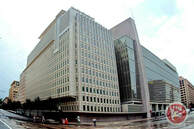
The World Bank approved a $30 million development policy grant, on Thursday, to support the Palestinian Authority’s reform program in strengthening fiscal resilience and creating an environment conducive for private investment and job creation.
The grant program Strengthening Fiscal Resilience and Business Environment Development Policy Grant will continue to support to the Palestinian Authority’s implementation of the Palestinian National Policy Agenda 2017-2022 with emphasis on improving government transparency of fiscal transfers to local service providers in key sectors, while reducing the fiscal drain on the Palestinian Authority’s budget.
Increasing the fiscal stability of the electricity, water, and health sectors will in turn build confidence of potential investors and lay the foundation for improved private sector activities.
“Within the current stalemate of declining economic growth and squeeze on liquidity, the Development Policy Grant remains a key instrument in supporting both reform priorities and coping with the fiscal problems. Enhancing sustainability and creditworthiness of service providers will not only stimulate economic activities and create jobs but will result in greater citizens’ trust,” said Anna Bjerde, World Bank Acting Country Director for West Bank and Gaza and Director of Strategy and Operations for the Middle East and North Africa Region.
This is the ninth in a series of development policy grants, totaling $340 million, of budget support grants for public sector governance and transparency reforms.
“While the new grant will continue to support progress to improve the Palestinian Authority’ s service delivery in energy, water and health, it is also essential to modernize and improve the legal and regulatory business environment to attract investors and entrepreneurs and to build on a new reform momentum in land administration and cashless mobile payments,” said Damir Cosic, World Bank Senior Economist.
The focus on land administration will not only contribute to larger tax collections but will increase the availability of collateral for bank lending (only titled land can be used for collateral).
In addition, the provision of mobile payments not only benefits financial inclusion of underbanked groups, but it is a cornerstone of provision of public services electronically (e-government) which holds great potential for the public sector to provide citizens with high quality services in a cost-effective manner.
Recently, France and Norway contributed a total amount of about $26 million to implement policies supported by the World Bank’s Development Policy Grant.
The grant program Strengthening Fiscal Resilience and Business Environment Development Policy Grant will continue to support to the Palestinian Authority’s implementation of the Palestinian National Policy Agenda 2017-2022 with emphasis on improving government transparency of fiscal transfers to local service providers in key sectors, while reducing the fiscal drain on the Palestinian Authority’s budget.
Increasing the fiscal stability of the electricity, water, and health sectors will in turn build confidence of potential investors and lay the foundation for improved private sector activities.
“Within the current stalemate of declining economic growth and squeeze on liquidity, the Development Policy Grant remains a key instrument in supporting both reform priorities and coping with the fiscal problems. Enhancing sustainability and creditworthiness of service providers will not only stimulate economic activities and create jobs but will result in greater citizens’ trust,” said Anna Bjerde, World Bank Acting Country Director for West Bank and Gaza and Director of Strategy and Operations for the Middle East and North Africa Region.
This is the ninth in a series of development policy grants, totaling $340 million, of budget support grants for public sector governance and transparency reforms.
“While the new grant will continue to support progress to improve the Palestinian Authority’ s service delivery in energy, water and health, it is also essential to modernize and improve the legal and regulatory business environment to attract investors and entrepreneurs and to build on a new reform momentum in land administration and cashless mobile payments,” said Damir Cosic, World Bank Senior Economist.
The focus on land administration will not only contribute to larger tax collections but will increase the availability of collateral for bank lending (only titled land can be used for collateral).
In addition, the provision of mobile payments not only benefits financial inclusion of underbanked groups, but it is a cornerstone of provision of public services electronically (e-government) which holds great potential for the public sector to provide citizens with high quality services in a cost-effective manner.
Recently, France and Norway contributed a total amount of about $26 million to implement policies supported by the World Bank’s Development Policy Grant.
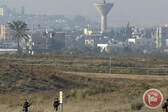
Israeli naval forces opened fire at Palestinian fishing boats off the coast of Rafah City in the southern besieged Gaza Strip, on Friday.
Witnesses told a Ma'an reporter that Israeli war boats opened fire targeting Palestinian fishermen off the coast of western Rafah City, forcing the fishermen to head back to shore in fear for their lives.
Meanwhile, Israeli soldiers deployed in military watchtowers in the al-Fukhari area in Khan Younis, in the southern Gaza Strip, opened fire towards Palestinian farmers in nearby agricultural lands.
No injuries were reported.
The Israeli army also regularly detains and opens fire on unarmed Palestinian fishermen, shepherds, and farmers along the border areas if they approach the buffer zone, as the authorities have not made clear the precise area of the designated zone.
The practice has in effect destroyed much of the agricultural and fishing sector of the blockaded coastal enclave, which has been under an Israeli air, land, and sea blockade for 10 years.
Witnesses told a Ma'an reporter that Israeli war boats opened fire targeting Palestinian fishermen off the coast of western Rafah City, forcing the fishermen to head back to shore in fear for their lives.
Meanwhile, Israeli soldiers deployed in military watchtowers in the al-Fukhari area in Khan Younis, in the southern Gaza Strip, opened fire towards Palestinian farmers in nearby agricultural lands.
No injuries were reported.
The Israeli army also regularly detains and opens fire on unarmed Palestinian fishermen, shepherds, and farmers along the border areas if they approach the buffer zone, as the authorities have not made clear the precise area of the designated zone.
The practice has in effect destroyed much of the agricultural and fishing sector of the blockaded coastal enclave, which has been under an Israeli air, land, and sea blockade for 10 years.
7 feb 2019

The Israeli occupation army on Wednesday displaced dozens of Bedouin families in the Jordan Valley at the pretext of carrying out military drills in their area.
Local sources told a reporter for the Palestinian Information Center (PIC) that a large number of Israeli tanks and heavy military vehicles stormed the areas of al-Ras al-Ahmar, al-Mayta, al-Burj and Hammamat al-Maleh in the Jordan Valley at dawn and ordered more than 50 impoverished Bedouin families to leave their homes until five o’clock in the evening.
They added that the troops carried out large-scale exercises in the area and destroyed vast tracts of cultivated land.
Every once in a while, the Israeli army displace Palestinian Bedouin families in the Jordan Valley in order to carry out drills.
Local sources told a reporter for the Palestinian Information Center (PIC) that a large number of Israeli tanks and heavy military vehicles stormed the areas of al-Ras al-Ahmar, al-Mayta, al-Burj and Hammamat al-Maleh in the Jordan Valley at dawn and ordered more than 50 impoverished Bedouin families to leave their homes until five o’clock in the evening.
They added that the troops carried out large-scale exercises in the area and destroyed vast tracts of cultivated land.
Every once in a while, the Israeli army displace Palestinian Bedouin families in the Jordan Valley in order to carry out drills.
6 feb 2019
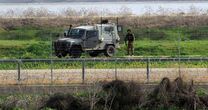
A Palestinian citizen was arrested by Israeli occupation forces on Wednesday after he was violently assaulted by Israeli settlers in the northern Jordan Valley.
Israelis residing in a settlement outpost built on Palestinian land in the northern Jordan Valley attacked Palestinian shepherds in the presence of Israeli soldiers.
Local activist Mootaz Besharat said Palestinian citizen Ahmad Daraghmeh was arrested by Israeli forces in the area.
Human rights institutions have warned that such crackdowns make part of an Israeli scheme aiming to force Palestinians out of the area in favor of illegal settlement expansion.
Israelis residing in a settlement outpost built on Palestinian land in the northern Jordan Valley attacked Palestinian shepherds in the presence of Israeli soldiers.
Local activist Mootaz Besharat said Palestinian citizen Ahmad Daraghmeh was arrested by Israeli forces in the area.
Human rights institutions have warned that such crackdowns make part of an Israeli scheme aiming to force Palestinians out of the area in favor of illegal settlement expansion.
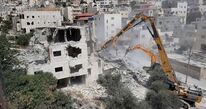
The Israeli occupation forces on Wednesday threatened the demolition of Palestinian structures in occupied Jerusalem’s al-Issawiya village.
Eye-witnesses said Israeli police stormed al-Issawiya village and photographed a number of Palestinian structures, pending their demolition.
The Israeli police ordered that a number of homes and shops be knocked down and to stop the construction of others under the guise of unlicensed construction.
Eye-witnesses said Israeli police stormed al-Issawiya village and photographed a number of Palestinian structures, pending their demolition.
The Israeli police ordered that a number of homes and shops be knocked down and to stop the construction of others under the guise of unlicensed construction.
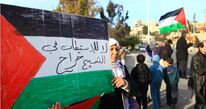
Israel's Jerusalem municipality on Tuesday announced a plan to build a new settler road stretching from Abu Dis town to Ma'ale Adumim settlement.
Head of the Palestinian Land Defense Committee in Jerusalem Bassam Bahar said in press statements that Israel is intending to seize over 1,000 dunums of Palestinian agricultural land in favor of this project.
Bahar explained that the project is aimed at linking several Israeli settlements in the area through a new road network.
Head of the Palestinian Land Defense Committee in Jerusalem Bassam Bahar said in press statements that Israel is intending to seize over 1,000 dunums of Palestinian agricultural land in favor of this project.
Bahar explained that the project is aimed at linking several Israeli settlements in the area through a new road network.
5 feb 2019
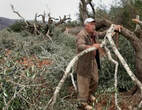
A group of illegal Israeli colonialist settlers uprooted, Tuesday, many olive saplings in the al-Hamra area, east of Yatta town, south of Hebron, in the southern part of the occupied West Bank.
Rateb Jabour, the coordinator of the Popular and National Committees in southern Hebron, said the assailants came from Ma’on illegal colony, which was built on Palestinian lands east of Yatta.
He added that the Israeli assailants uprooted 23 olive saplings in the al-Hamra area, east of the Tiwana village, and that the orchard is owned by Jom’a Mousa Rib’ey.
Jabour also stated that such attacks have witnessed a serious escalation in recent years, and aim at forcing the indigenous Palestinians out of their lands, in order to build and expand the illegal colonies, in direct violation of International Law and the Fourth Geneva Convention.
He called on various local and international human rights groups to intervene and end the escalating Israeli violations, especially since the illegal colonists are encouraged by the extremist government of Benjamin Netanyahu.
Rateb Jabour, the coordinator of the Popular and National Committees in southern Hebron, said the assailants came from Ma’on illegal colony, which was built on Palestinian lands east of Yatta.
He added that the Israeli assailants uprooted 23 olive saplings in the al-Hamra area, east of the Tiwana village, and that the orchard is owned by Jom’a Mousa Rib’ey.
Jabour also stated that such attacks have witnessed a serious escalation in recent years, and aim at forcing the indigenous Palestinians out of their lands, in order to build and expand the illegal colonies, in direct violation of International Law and the Fourth Geneva Convention.
He called on various local and international human rights groups to intervene and end the escalating Israeli violations, especially since the illegal colonists are encouraged by the extremist government of Benjamin Netanyahu.
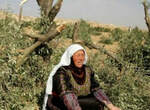
On Tuesday, dozens of Israeli soldiers, accompanied by bulldozers, invaded Palestinian orchards in Bardala village, in the West Bank’s Northern Plains, and uprooted at least 450 olive trees.
Media sources said the soldiers surrounded the entire area, before invading it, and proceeded to uproot the olive trees, owned by several villagers.
They added that, last year, the army issued orders for uprooting the trees in that area, after alleging that the orchards are in “state-owned lands,” which have been illegally confiscated.
Bardala village is one of the very few Jordan Valley villages designated as area B, under the Oslo accords, giving some theoretical rights to the local population to have control over infrastructure and planning controls.
However, just 3 km2 in the center of the village is in area B, and all surrounding areas and farmland are in Area C, over which the Israel army has absolute control in the occupied West Bank.
Media sources said the soldiers surrounded the entire area, before invading it, and proceeded to uproot the olive trees, owned by several villagers.
They added that, last year, the army issued orders for uprooting the trees in that area, after alleging that the orchards are in “state-owned lands,” which have been illegally confiscated.
Bardala village is one of the very few Jordan Valley villages designated as area B, under the Oslo accords, giving some theoretical rights to the local population to have control over infrastructure and planning controls.
However, just 3 km2 in the center of the village is in area B, and all surrounding areas and farmland are in Area C, over which the Israel army has absolute control in the occupied West Bank.
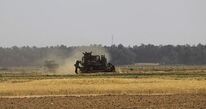
Israeli military vehicles rolled on Tuesday morning into Palestinian lands south of the blockaded Gaza Strip at the same time as naval forces opened fire at fishermen off Gaza’s seashore.
Eye-witnesses said four Israeli military bulldozes escorted by an army jeep moved from Kissufim site, south of the Gaza Strip, northwards.
The army vehicles leveled Palestinian lands south of the besieged coastal enclave.
Meanwhile, the committee documenting Israeli violations against Gaza fishermen said Israeli gunboats targeted Palestinian fishing boats with machine gunfire. No injuries were reported.
Eye-witnesses said four Israeli military bulldozes escorted by an army jeep moved from Kissufim site, south of the Gaza Strip, northwards.
The army vehicles leveled Palestinian lands south of the besieged coastal enclave.
Meanwhile, the committee documenting Israeli violations against Gaza fishermen said Israeli gunboats targeted Palestinian fishing boats with machine gunfire. No injuries were reported.
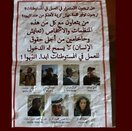
The residents of Tekoa village, near Jenin in the northern part of the West Bank, were shocked to find placards posted around their village on Sunday by Israeli military settlers threatening their livelihoods if they associated with members of Israeli and international peace groups.
The placards included a ‘hit list’ of photos of some of the leaders of the organizations in question, which include Rabbis for Human Rights, and the Popular Committee Against the Wall and Settlements.
The statement also included a caveat that if residents worked with or talked to lawyers to secure their legal rights to their land, they would be targeted by the paramilitary colonial settlers.
The posters stated that if any residents of the area choose to associate with any of the listed people or organizations, they would never be able to work again in the Israeli settlements in the area.
The publications included pictures of a member of the National Council and the Central Council of Fatah, Sheikh Dawood al-Zair, human rights lawyers and Nasri Suleiman, a member of the municipality of Janata responsible for monitoring the land threatened with confiscation.
A member of the National Council of Fatah, and one of those listed on the poster, Sheikh Dawood al-Zair, told Ma’an News Agency that in recent weeks, the municipality of Janata, along with Palestinian officials including himself, had told residents of the village that they could go to their farmland for plowing and planting – despite numerous recent threats from the paramilitary Israeli settlers attempting to take over Palestinian land in the area.
He said that several days ago he himself went to plow his land near Nokdim settlement. The Israeli paramilitary settlers attacked him and the other farmers with him, and forced them to stop plowing on their land. The Israeli army intervened and told the villagers to stop plowing and to leave the land.
Al-Zair pointed out that the Israeli settlers have engaged in violent seizure of land in that area, and have used force to illegally annex Palestinian farmland to their settlements and illegal outposts constructed over the last several years in the area.
According to al-Zair, the distribution of these leaflets was an action by the settlers to try to “intimidate the people and threaten them that if they stand with us, their livelihoods will be cut off. But this threat will not stop us. It is our duty to defend the land.”
He called on the Palestinian citizens to go to their land and farm as they do every year at this time, stressing his readiness and the readiness of official Palestinian bodies to stand by their side and provide them with everything that facilitates their access to their land and plowing and planting.
Farmers and land owners appealed to the authorities to help them reach their land permanently, stressing that they are ready to pay all they have to reclaim their land, where they are facing continual Israeli settler attacks.
In recent years, the Israeli occupation authorities have begun to build dozens of houses between the settlements of Nikodim and Taku’a on the land of the residents of Al Aqaban area, east of Bethlehem, within the framework of a plan to create a geographical settlement by connecting five settlement outposts and three existing settlements Gush Etzion East.
For his part, the mayor of Jenin, Ziad Ali said that the municipality coordinates through the lawyers to facilitate the access of residents of East Bethlehem to their land and plowing, but recently there is no response by the occupation authorities to coordinate access to land.
He added that there is a slowdown in the granting of coordination by the so-called “Civil Administration” of the Israeli occupation army, and even if such permission is granted by the occupying Israeli army, Palestinian citizens who receive permits are often surprised upon arrival to their land by attacks by settlers, and no presence of the Israeli military.
The occupation government announced in the middle of last year that they would be adding 500 settlement units in the settlement outpost “Dad”, located on land owned by Palestinians near Mount Fradis east of Bethlehem.
The representative of the popular Committee Against the Wall and Settlements in Bethlehem, Hassan Brigieh, said that the Israeli occupation has resorted to the expansion of illegal settlements in order to further divide the West Bank by creating a “settlement belt” on land that the Israeli government considers “wilderness” east of Hebron and south of Bethlehem.
None of the land in question is “wilderness”, however. It is all owned by Palestinian landowners and is farmland and olive groves, not wilderness.
This Israeli policy aims to impose the siege through a separation belt between the Dead Sea (East Jerusalem) and the areas east of Hebron and Bethlehem (south) and Jerusalem to divide and destroy the West Bank, where over 3 million Palestinians live.
The placards included a ‘hit list’ of photos of some of the leaders of the organizations in question, which include Rabbis for Human Rights, and the Popular Committee Against the Wall and Settlements.
The statement also included a caveat that if residents worked with or talked to lawyers to secure their legal rights to their land, they would be targeted by the paramilitary colonial settlers.
The posters stated that if any residents of the area choose to associate with any of the listed people or organizations, they would never be able to work again in the Israeli settlements in the area.
The publications included pictures of a member of the National Council and the Central Council of Fatah, Sheikh Dawood al-Zair, human rights lawyers and Nasri Suleiman, a member of the municipality of Janata responsible for monitoring the land threatened with confiscation.
A member of the National Council of Fatah, and one of those listed on the poster, Sheikh Dawood al-Zair, told Ma’an News Agency that in recent weeks, the municipality of Janata, along with Palestinian officials including himself, had told residents of the village that they could go to their farmland for plowing and planting – despite numerous recent threats from the paramilitary Israeli settlers attempting to take over Palestinian land in the area.
He said that several days ago he himself went to plow his land near Nokdim settlement. The Israeli paramilitary settlers attacked him and the other farmers with him, and forced them to stop plowing on their land. The Israeli army intervened and told the villagers to stop plowing and to leave the land.
Al-Zair pointed out that the Israeli settlers have engaged in violent seizure of land in that area, and have used force to illegally annex Palestinian farmland to their settlements and illegal outposts constructed over the last several years in the area.
According to al-Zair, the distribution of these leaflets was an action by the settlers to try to “intimidate the people and threaten them that if they stand with us, their livelihoods will be cut off. But this threat will not stop us. It is our duty to defend the land.”
He called on the Palestinian citizens to go to their land and farm as they do every year at this time, stressing his readiness and the readiness of official Palestinian bodies to stand by their side and provide them with everything that facilitates their access to their land and plowing and planting.
Farmers and land owners appealed to the authorities to help them reach their land permanently, stressing that they are ready to pay all they have to reclaim their land, where they are facing continual Israeli settler attacks.
In recent years, the Israeli occupation authorities have begun to build dozens of houses between the settlements of Nikodim and Taku’a on the land of the residents of Al Aqaban area, east of Bethlehem, within the framework of a plan to create a geographical settlement by connecting five settlement outposts and three existing settlements Gush Etzion East.
For his part, the mayor of Jenin, Ziad Ali said that the municipality coordinates through the lawyers to facilitate the access of residents of East Bethlehem to their land and plowing, but recently there is no response by the occupation authorities to coordinate access to land.
He added that there is a slowdown in the granting of coordination by the so-called “Civil Administration” of the Israeli occupation army, and even if such permission is granted by the occupying Israeli army, Palestinian citizens who receive permits are often surprised upon arrival to their land by attacks by settlers, and no presence of the Israeli military.
The occupation government announced in the middle of last year that they would be adding 500 settlement units in the settlement outpost “Dad”, located on land owned by Palestinians near Mount Fradis east of Bethlehem.
The representative of the popular Committee Against the Wall and Settlements in Bethlehem, Hassan Brigieh, said that the Israeli occupation has resorted to the expansion of illegal settlements in order to further divide the West Bank by creating a “settlement belt” on land that the Israeli government considers “wilderness” east of Hebron and south of Bethlehem.
None of the land in question is “wilderness”, however. It is all owned by Palestinian landowners and is farmland and olive groves, not wilderness.
This Israeli policy aims to impose the siege through a separation belt between the Dead Sea (East Jerusalem) and the areas east of Hebron and Bethlehem (south) and Jerusalem to divide and destroy the West Bank, where over 3 million Palestinians live.
3 feb 2019
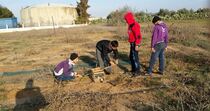
The Israeli occupation forces on Sunday morning opened fire at Palestinian farmers and bird hunters along the eastern border of the southern Gaza Strip.
Safa news agency said that the Israeli forces heavily opened fire towards agricultural lands east of Khan Younis city.
Other shooting attacks were witnessed in the neighboring Rafah city, but no injuries were reported.
Dozens of Palestinians have been killed as the Israeli occupation army constantly targets farmers, shepherds, and bird hunters working in their lands which are close to the border between the Gaza Strip and the Palestinian territories occupied since 1948.
Safa news agency said that the Israeli forces heavily opened fire towards agricultural lands east of Khan Younis city.
Other shooting attacks were witnessed in the neighboring Rafah city, but no injuries were reported.
Dozens of Palestinians have been killed as the Israeli occupation army constantly targets farmers, shepherds, and bird hunters working in their lands which are close to the border between the Gaza Strip and the Palestinian territories occupied since 1948.
1 feb 2019
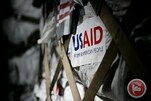
The United States Agency for International Development (USAID) has ended all assistance to Palestinians in the occupied West Bank and besieged Gaza Strip, a US official confirmed on Friday.
According to Reuters news outlet, the decision was linked to a January 31st deadline set by new US legislation under which foreign aid recipients would be more exposed to anti-terrorism lawsuits.
The deadline also sees the end of some $60 million in U.S. aid for the Palestinian security forces, whose cooperation with Israeli forces helps maintain relative quiet in the West Bank.
The Anti-Terrorism Clarification Act (ATCA), which was passed by the US Congress in 2018, empowers Americans to sue foreign aid recipients in US courts over alleged complicity in “acts of war,” however, the Palestinians have declined further US funding, worried about legal jeopardy.
A US official “At the request of the Palestinian Authority, we have wound down certain projects and programs funded with assistance under the authorities specified in ATCA in the West Bank and Gaza.”
The official confirmed that “all USAID assistance in the West Bank and Gaza has ceased.”
The official said no steps were being taken to close the USAID mission in the Palestinian territories and no decision had been made about future staffing at the USAID mission in the US Embassy in Jerusalem.
According to Reuters news outlet, the decision was linked to a January 31st deadline set by new US legislation under which foreign aid recipients would be more exposed to anti-terrorism lawsuits.
The deadline also sees the end of some $60 million in U.S. aid for the Palestinian security forces, whose cooperation with Israeli forces helps maintain relative quiet in the West Bank.
The Anti-Terrorism Clarification Act (ATCA), which was passed by the US Congress in 2018, empowers Americans to sue foreign aid recipients in US courts over alleged complicity in “acts of war,” however, the Palestinians have declined further US funding, worried about legal jeopardy.
A US official “At the request of the Palestinian Authority, we have wound down certain projects and programs funded with assistance under the authorities specified in ATCA in the West Bank and Gaza.”
The official confirmed that “all USAID assistance in the West Bank and Gaza has ceased.”
The official said no steps were being taken to close the USAID mission in the Palestinian territories and no decision had been made about future staffing at the USAID mission in the US Embassy in Jerusalem.
